Communication Reflection: Foundation of Professional Practice Report
VerifiedAdded on 2022/08/10
|7
|1931
|28
Report
AI Summary
This report presents a student's reflection on a communication experience within a community residential setting, focusing on interactions with individuals facing various disabilities, including epilepsy. The student details their initial feelings of nervousness and questions regarding patient care plans and communication methods. The report evaluates the placement, highlighting positive interactions and the challenges faced, such as language barriers and social exclusion. Using the Gibbs Model of Reflection, the student analyzes the experience, concluding that effective communication, empathy, and tailored care plans are crucial for patient well-being. The report also covers the importance of addressing the social and emotional needs of patients and the limitations in healthcare facilities. An action plan outlines how the student would approach similar situations in the future, emphasizing improved communication skills and individualized care strategies. The student also provides a comprehensive bibliography of relevant literature.
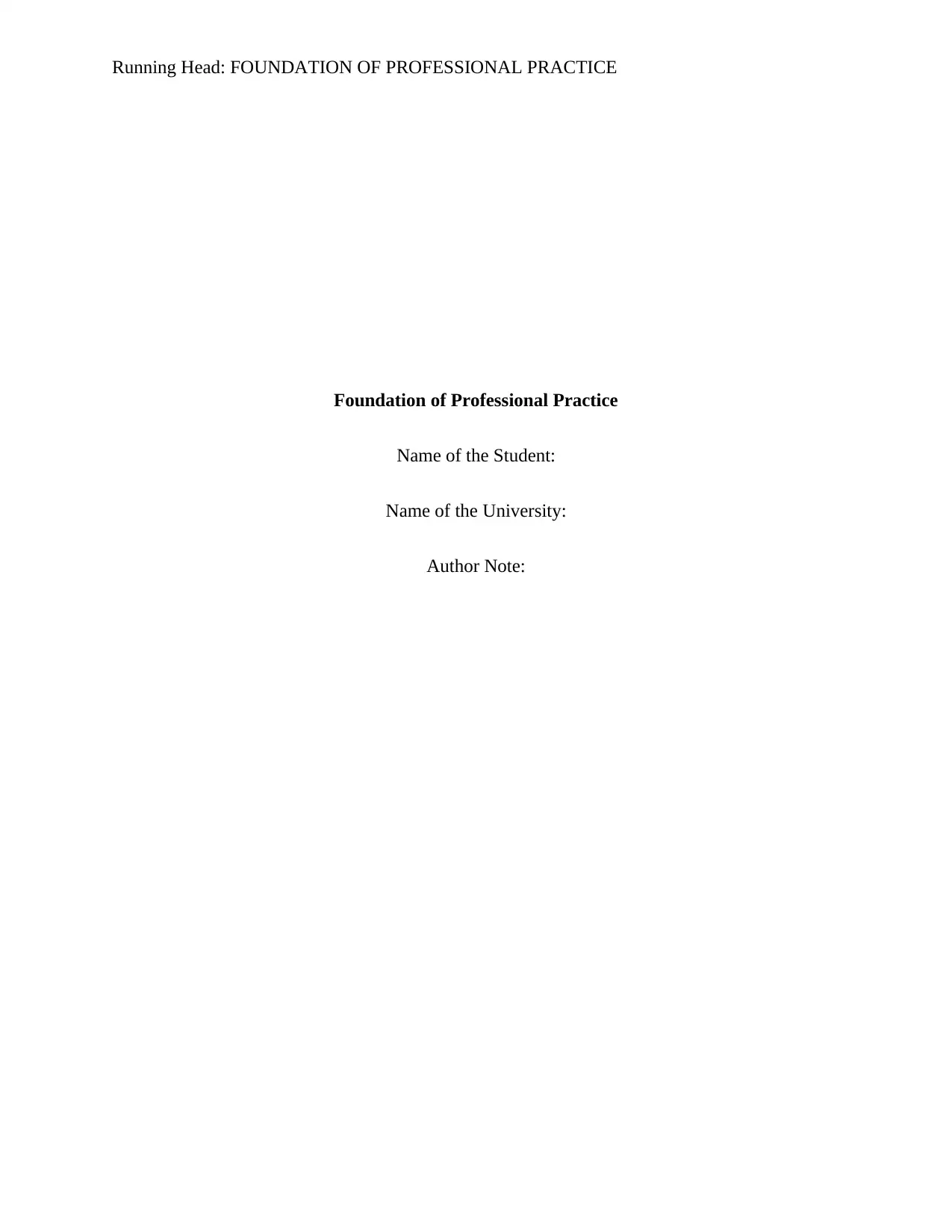
Running Head: FOUNDATION OF PROFESSIONAL PRACTICE
Foundation of Professional Practice
Name of the Student:
Name of the University:
Author Note:
Foundation of Professional Practice
Name of the Student:
Name of the University:
Author Note:
Paraphrase This Document
Need a fresh take? Get an instant paraphrase of this document with our AI Paraphraser
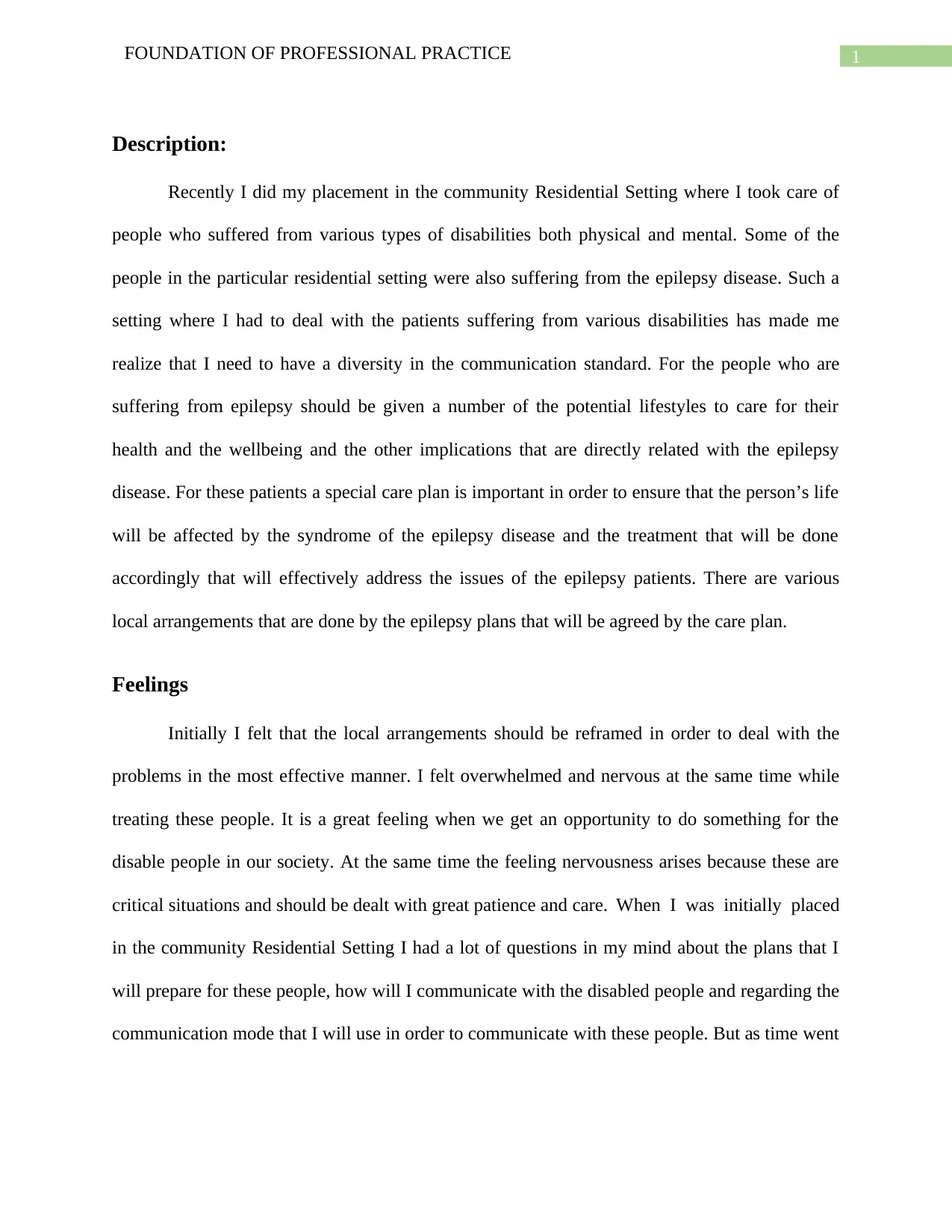
1FOUNDATION OF PROFESSIONAL PRACTICE
Description:
Recently I did my placement in the community Residential Setting where I took care of
people who suffered from various types of disabilities both physical and mental. Some of the
people in the particular residential setting were also suffering from the epilepsy disease. Such a
setting where I had to deal with the patients suffering from various disabilities has made me
realize that I need to have a diversity in the communication standard. For the people who are
suffering from epilepsy should be given a number of the potential lifestyles to care for their
health and the wellbeing and the other implications that are directly related with the epilepsy
disease. For these patients a special care plan is important in order to ensure that the person’s life
will be affected by the syndrome of the epilepsy disease and the treatment that will be done
accordingly that will effectively address the issues of the epilepsy patients. There are various
local arrangements that are done by the epilepsy plans that will be agreed by the care plan.
Feelings
Initially I felt that the local arrangements should be reframed in order to deal with the
problems in the most effective manner. I felt overwhelmed and nervous at the same time while
treating these people. It is a great feeling when we get an opportunity to do something for the
disable people in our society. At the same time the feeling nervousness arises because these are
critical situations and should be dealt with great patience and care. When I was initially placed
in the community Residential Setting I had a lot of questions in my mind about the plans that I
will prepare for these people, how will I communicate with the disabled people and regarding the
communication mode that I will use in order to communicate with these people. But as time went
Description:
Recently I did my placement in the community Residential Setting where I took care of
people who suffered from various types of disabilities both physical and mental. Some of the
people in the particular residential setting were also suffering from the epilepsy disease. Such a
setting where I had to deal with the patients suffering from various disabilities has made me
realize that I need to have a diversity in the communication standard. For the people who are
suffering from epilepsy should be given a number of the potential lifestyles to care for their
health and the wellbeing and the other implications that are directly related with the epilepsy
disease. For these patients a special care plan is important in order to ensure that the person’s life
will be affected by the syndrome of the epilepsy disease and the treatment that will be done
accordingly that will effectively address the issues of the epilepsy patients. There are various
local arrangements that are done by the epilepsy plans that will be agreed by the care plan.
Feelings
Initially I felt that the local arrangements should be reframed in order to deal with the
problems in the most effective manner. I felt overwhelmed and nervous at the same time while
treating these people. It is a great feeling when we get an opportunity to do something for the
disable people in our society. At the same time the feeling nervousness arises because these are
critical situations and should be dealt with great patience and care. When I was initially placed
in the community Residential Setting I had a lot of questions in my mind about the plans that I
will prepare for these people, how will I communicate with the disabled people and regarding the
communication mode that I will use in order to communicate with these people. But as time went
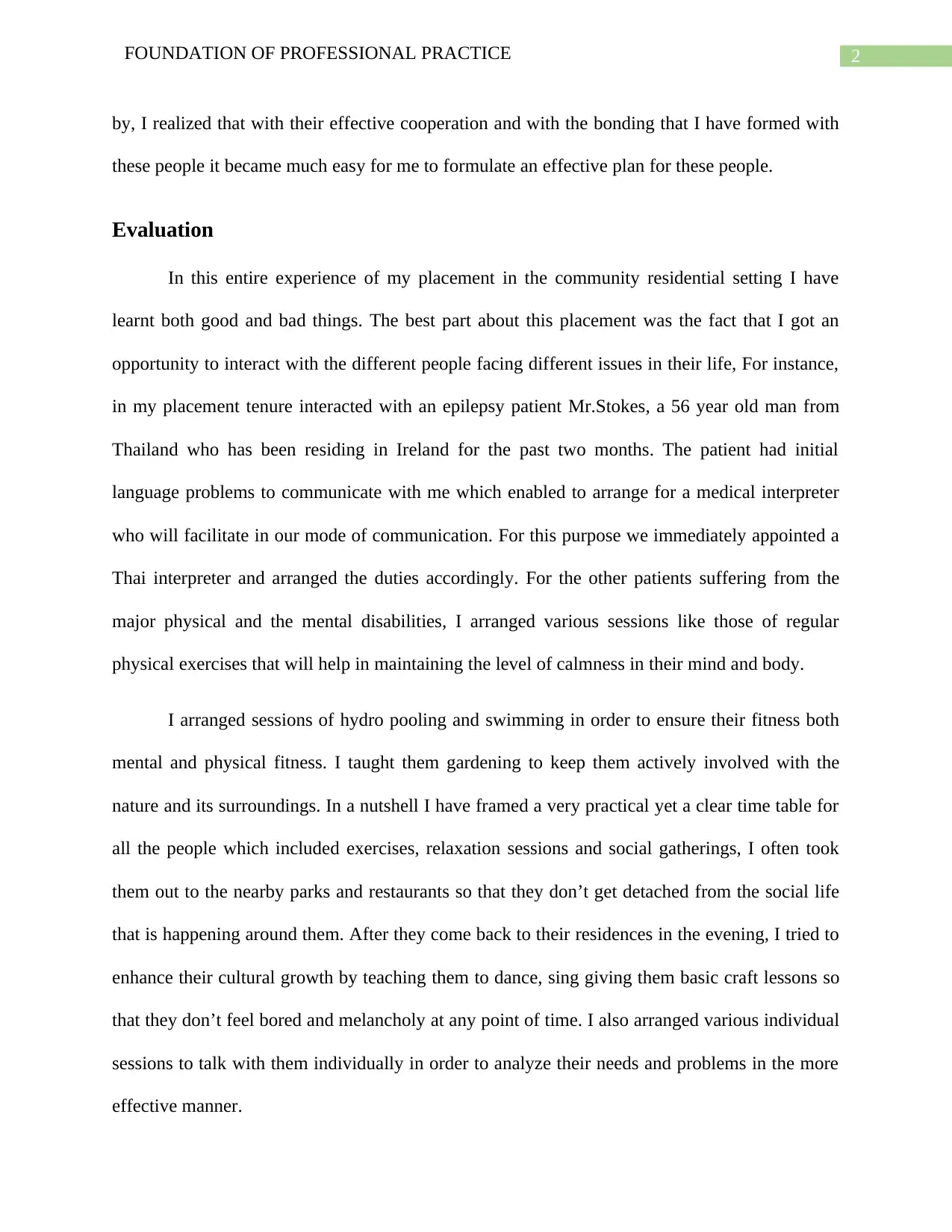
2FOUNDATION OF PROFESSIONAL PRACTICE
by, I realized that with their effective cooperation and with the bonding that I have formed with
these people it became much easy for me to formulate an effective plan for these people.
Evaluation
In this entire experience of my placement in the community residential setting I have
learnt both good and bad things. The best part about this placement was the fact that I got an
opportunity to interact with the different people facing different issues in their life, For instance,
in my placement tenure interacted with an epilepsy patient Mr.Stokes, a 56 year old man from
Thailand who has been residing in Ireland for the past two months. The patient had initial
language problems to communicate with me which enabled to arrange for a medical interpreter
who will facilitate in our mode of communication. For this purpose we immediately appointed a
Thai interpreter and arranged the duties accordingly. For the other patients suffering from the
major physical and the mental disabilities, I arranged various sessions like those of regular
physical exercises that will help in maintaining the level of calmness in their mind and body.
I arranged sessions of hydro pooling and swimming in order to ensure their fitness both
mental and physical fitness. I taught them gardening to keep them actively involved with the
nature and its surroundings. In a nutshell I have framed a very practical yet a clear time table for
all the people which included exercises, relaxation sessions and social gatherings, I often took
them out to the nearby parks and restaurants so that they don’t get detached from the social life
that is happening around them. After they come back to their residences in the evening, I tried to
enhance their cultural growth by teaching them to dance, sing giving them basic craft lessons so
that they don’t feel bored and melancholy at any point of time. I also arranged various individual
sessions to talk with them individually in order to analyze their needs and problems in the more
effective manner.
by, I realized that with their effective cooperation and with the bonding that I have formed with
these people it became much easy for me to formulate an effective plan for these people.
Evaluation
In this entire experience of my placement in the community residential setting I have
learnt both good and bad things. The best part about this placement was the fact that I got an
opportunity to interact with the different people facing different issues in their life, For instance,
in my placement tenure interacted with an epilepsy patient Mr.Stokes, a 56 year old man from
Thailand who has been residing in Ireland for the past two months. The patient had initial
language problems to communicate with me which enabled to arrange for a medical interpreter
who will facilitate in our mode of communication. For this purpose we immediately appointed a
Thai interpreter and arranged the duties accordingly. For the other patients suffering from the
major physical and the mental disabilities, I arranged various sessions like those of regular
physical exercises that will help in maintaining the level of calmness in their mind and body.
I arranged sessions of hydro pooling and swimming in order to ensure their fitness both
mental and physical fitness. I taught them gardening to keep them actively involved with the
nature and its surroundings. In a nutshell I have framed a very practical yet a clear time table for
all the people which included exercises, relaxation sessions and social gatherings, I often took
them out to the nearby parks and restaurants so that they don’t get detached from the social life
that is happening around them. After they come back to their residences in the evening, I tried to
enhance their cultural growth by teaching them to dance, sing giving them basic craft lessons so
that they don’t feel bored and melancholy at any point of time. I also arranged various individual
sessions to talk with them individually in order to analyze their needs and problems in the more
effective manner.
⊘ This is a preview!⊘
Do you want full access?
Subscribe today to unlock all pages.

Trusted by 1+ million students worldwide
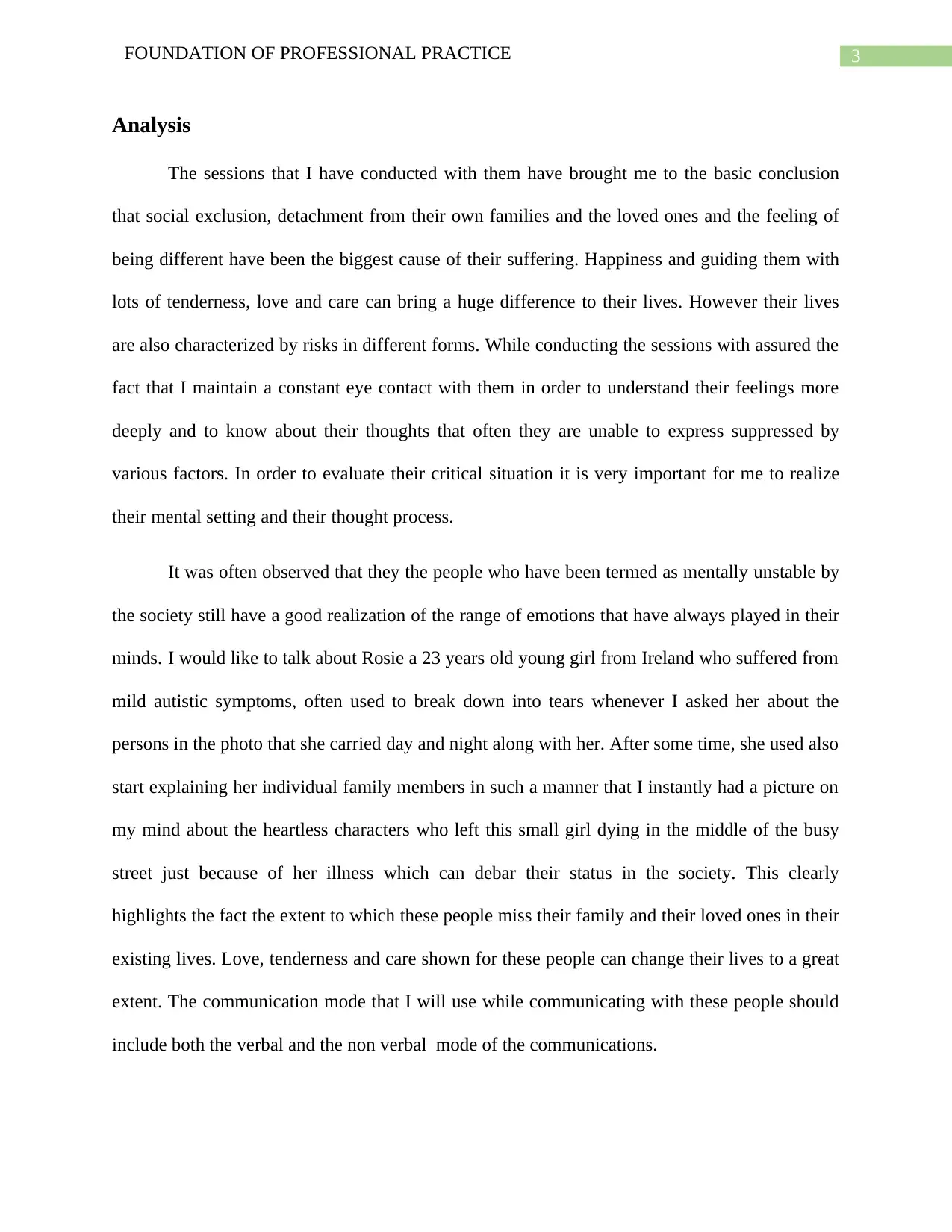
3FOUNDATION OF PROFESSIONAL PRACTICE
Analysis
The sessions that I have conducted with them have brought me to the basic conclusion
that social exclusion, detachment from their own families and the loved ones and the feeling of
being different have been the biggest cause of their suffering. Happiness and guiding them with
lots of tenderness, love and care can bring a huge difference to their lives. However their lives
are also characterized by risks in different forms. While conducting the sessions with assured the
fact that I maintain a constant eye contact with them in order to understand their feelings more
deeply and to know about their thoughts that often they are unable to express suppressed by
various factors. In order to evaluate their critical situation it is very important for me to realize
their mental setting and their thought process.
It was often observed that they the people who have been termed as mentally unstable by
the society still have a good realization of the range of emotions that have always played in their
minds. I would like to talk about Rosie a 23 years old young girl from Ireland who suffered from
mild autistic symptoms, often used to break down into tears whenever I asked her about the
persons in the photo that she carried day and night along with her. After some time, she used also
start explaining her individual family members in such a manner that I instantly had a picture on
my mind about the heartless characters who left this small girl dying in the middle of the busy
street just because of her illness which can debar their status in the society. This clearly
highlights the fact the extent to which these people miss their family and their loved ones in their
existing lives. Love, tenderness and care shown for these people can change their lives to a great
extent. The communication mode that I will use while communicating with these people should
include both the verbal and the non verbal mode of the communications.
Analysis
The sessions that I have conducted with them have brought me to the basic conclusion
that social exclusion, detachment from their own families and the loved ones and the feeling of
being different have been the biggest cause of their suffering. Happiness and guiding them with
lots of tenderness, love and care can bring a huge difference to their lives. However their lives
are also characterized by risks in different forms. While conducting the sessions with assured the
fact that I maintain a constant eye contact with them in order to understand their feelings more
deeply and to know about their thoughts that often they are unable to express suppressed by
various factors. In order to evaluate their critical situation it is very important for me to realize
their mental setting and their thought process.
It was often observed that they the people who have been termed as mentally unstable by
the society still have a good realization of the range of emotions that have always played in their
minds. I would like to talk about Rosie a 23 years old young girl from Ireland who suffered from
mild autistic symptoms, often used to break down into tears whenever I asked her about the
persons in the photo that she carried day and night along with her. After some time, she used also
start explaining her individual family members in such a manner that I instantly had a picture on
my mind about the heartless characters who left this small girl dying in the middle of the busy
street just because of her illness which can debar their status in the society. This clearly
highlights the fact the extent to which these people miss their family and their loved ones in their
existing lives. Love, tenderness and care shown for these people can change their lives to a great
extent. The communication mode that I will use while communicating with these people should
include both the verbal and the non verbal mode of the communications.
Paraphrase This Document
Need a fresh take? Get an instant paraphrase of this document with our AI Paraphraser
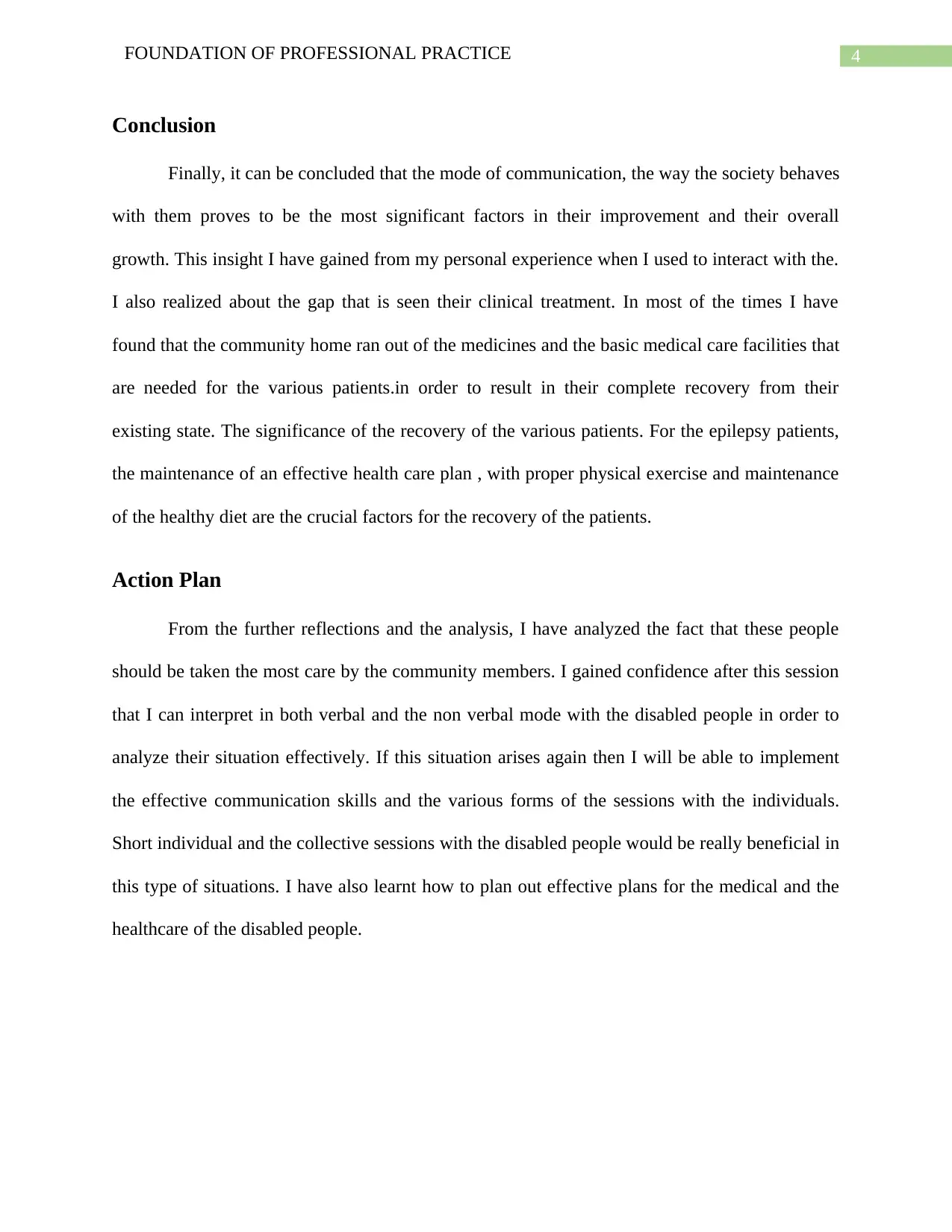
4FOUNDATION OF PROFESSIONAL PRACTICE
Conclusion
Finally, it can be concluded that the mode of communication, the way the society behaves
with them proves to be the most significant factors in their improvement and their overall
growth. This insight I have gained from my personal experience when I used to interact with the.
I also realized about the gap that is seen their clinical treatment. In most of the times I have
found that the community home ran out of the medicines and the basic medical care facilities that
are needed for the various patients.in order to result in their complete recovery from their
existing state. The significance of the recovery of the various patients. For the epilepsy patients,
the maintenance of an effective health care plan , with proper physical exercise and maintenance
of the healthy diet are the crucial factors for the recovery of the patients.
Action Plan
From the further reflections and the analysis, I have analyzed the fact that these people
should be taken the most care by the community members. I gained confidence after this session
that I can interpret in both verbal and the non verbal mode with the disabled people in order to
analyze their situation effectively. If this situation arises again then I will be able to implement
the effective communication skills and the various forms of the sessions with the individuals.
Short individual and the collective sessions with the disabled people would be really beneficial in
this type of situations. I have also learnt how to plan out effective plans for the medical and the
healthcare of the disabled people.
Conclusion
Finally, it can be concluded that the mode of communication, the way the society behaves
with them proves to be the most significant factors in their improvement and their overall
growth. This insight I have gained from my personal experience when I used to interact with the.
I also realized about the gap that is seen their clinical treatment. In most of the times I have
found that the community home ran out of the medicines and the basic medical care facilities that
are needed for the various patients.in order to result in their complete recovery from their
existing state. The significance of the recovery of the various patients. For the epilepsy patients,
the maintenance of an effective health care plan , with proper physical exercise and maintenance
of the healthy diet are the crucial factors for the recovery of the patients.
Action Plan
From the further reflections and the analysis, I have analyzed the fact that these people
should be taken the most care by the community members. I gained confidence after this session
that I can interpret in both verbal and the non verbal mode with the disabled people in order to
analyze their situation effectively. If this situation arises again then I will be able to implement
the effective communication skills and the various forms of the sessions with the individuals.
Short individual and the collective sessions with the disabled people would be really beneficial in
this type of situations. I have also learnt how to plan out effective plans for the medical and the
healthcare of the disabled people.
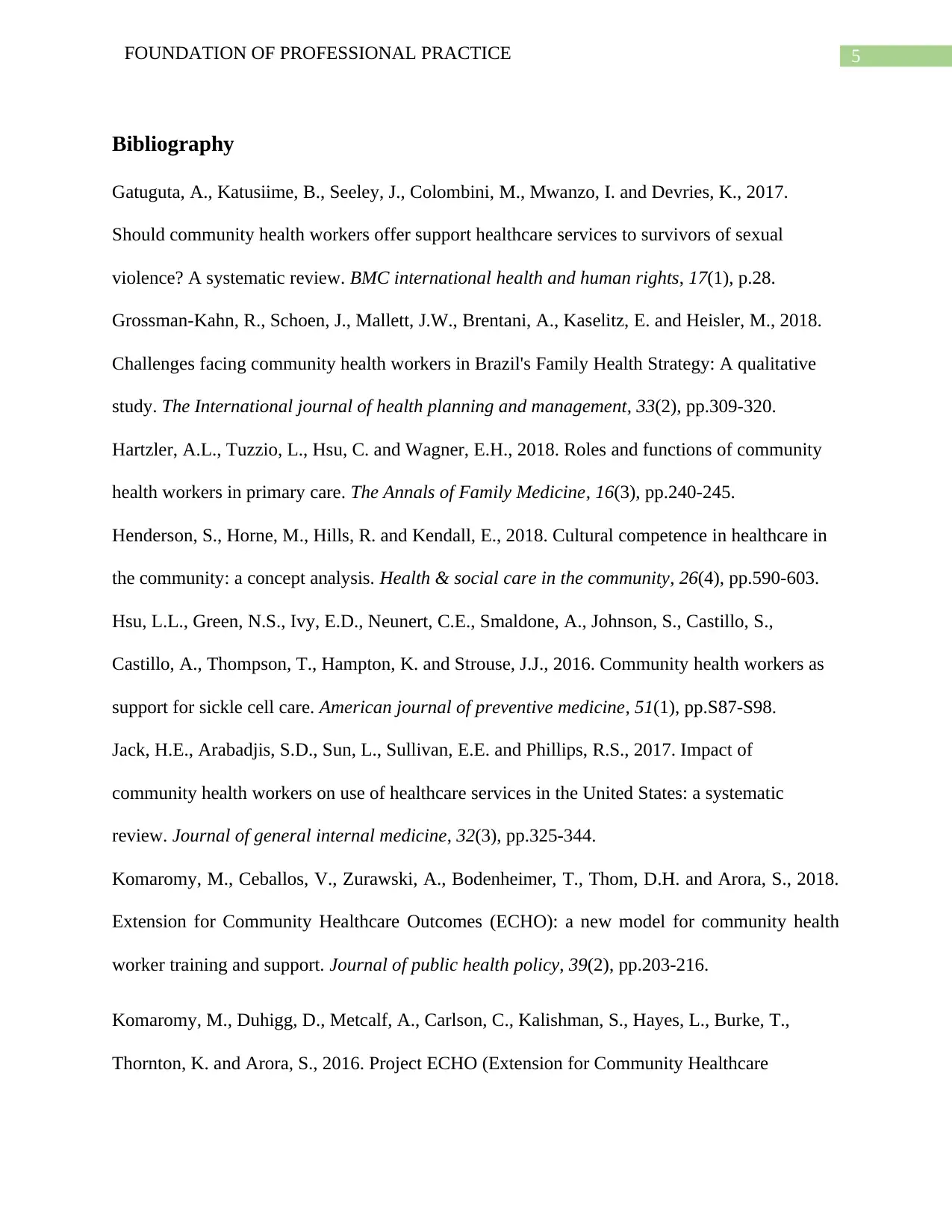
5FOUNDATION OF PROFESSIONAL PRACTICE
Bibliography
Gatuguta, A., Katusiime, B., Seeley, J., Colombini, M., Mwanzo, I. and Devries, K., 2017.
Should community health workers offer support healthcare services to survivors of sexual
violence? A systematic review. BMC international health and human rights, 17(1), p.28.
Grossman‐Kahn, R., Schoen, J., Mallett, J.W., Brentani, A., Kaselitz, E. and Heisler, M., 2018.
Challenges facing community health workers in Brazil's Family Health Strategy: A qualitative
study. The International journal of health planning and management, 33(2), pp.309-320.
Hartzler, A.L., Tuzzio, L., Hsu, C. and Wagner, E.H., 2018. Roles and functions of community
health workers in primary care. The Annals of Family Medicine, 16(3), pp.240-245.
Henderson, S., Horne, M., Hills, R. and Kendall, E., 2018. Cultural competence in healthcare in
the community: a concept analysis. Health & social care in the community, 26(4), pp.590-603.
Hsu, L.L., Green, N.S., Ivy, E.D., Neunert, C.E., Smaldone, A., Johnson, S., Castillo, S.,
Castillo, A., Thompson, T., Hampton, K. and Strouse, J.J., 2016. Community health workers as
support for sickle cell care. American journal of preventive medicine, 51(1), pp.S87-S98.
Jack, H.E., Arabadjis, S.D., Sun, L., Sullivan, E.E. and Phillips, R.S., 2017. Impact of
community health workers on use of healthcare services in the United States: a systematic
review. Journal of general internal medicine, 32(3), pp.325-344.
Komaromy, M., Ceballos, V., Zurawski, A., Bodenheimer, T., Thom, D.H. and Arora, S., 2018.
Extension for Community Healthcare Outcomes (ECHO): a new model for community health
worker training and support. Journal of public health policy, 39(2), pp.203-216.
Komaromy, M., Duhigg, D., Metcalf, A., Carlson, C., Kalishman, S., Hayes, L., Burke, T.,
Thornton, K. and Arora, S., 2016. Project ECHO (Extension for Community Healthcare
Bibliography
Gatuguta, A., Katusiime, B., Seeley, J., Colombini, M., Mwanzo, I. and Devries, K., 2017.
Should community health workers offer support healthcare services to survivors of sexual
violence? A systematic review. BMC international health and human rights, 17(1), p.28.
Grossman‐Kahn, R., Schoen, J., Mallett, J.W., Brentani, A., Kaselitz, E. and Heisler, M., 2018.
Challenges facing community health workers in Brazil's Family Health Strategy: A qualitative
study. The International journal of health planning and management, 33(2), pp.309-320.
Hartzler, A.L., Tuzzio, L., Hsu, C. and Wagner, E.H., 2018. Roles and functions of community
health workers in primary care. The Annals of Family Medicine, 16(3), pp.240-245.
Henderson, S., Horne, M., Hills, R. and Kendall, E., 2018. Cultural competence in healthcare in
the community: a concept analysis. Health & social care in the community, 26(4), pp.590-603.
Hsu, L.L., Green, N.S., Ivy, E.D., Neunert, C.E., Smaldone, A., Johnson, S., Castillo, S.,
Castillo, A., Thompson, T., Hampton, K. and Strouse, J.J., 2016. Community health workers as
support for sickle cell care. American journal of preventive medicine, 51(1), pp.S87-S98.
Jack, H.E., Arabadjis, S.D., Sun, L., Sullivan, E.E. and Phillips, R.S., 2017. Impact of
community health workers on use of healthcare services in the United States: a systematic
review. Journal of general internal medicine, 32(3), pp.325-344.
Komaromy, M., Ceballos, V., Zurawski, A., Bodenheimer, T., Thom, D.H. and Arora, S., 2018.
Extension for Community Healthcare Outcomes (ECHO): a new model for community health
worker training and support. Journal of public health policy, 39(2), pp.203-216.
Komaromy, M., Duhigg, D., Metcalf, A., Carlson, C., Kalishman, S., Hayes, L., Burke, T.,
Thornton, K. and Arora, S., 2016. Project ECHO (Extension for Community Healthcare
⊘ This is a preview!⊘
Do you want full access?
Subscribe today to unlock all pages.

Trusted by 1+ million students worldwide
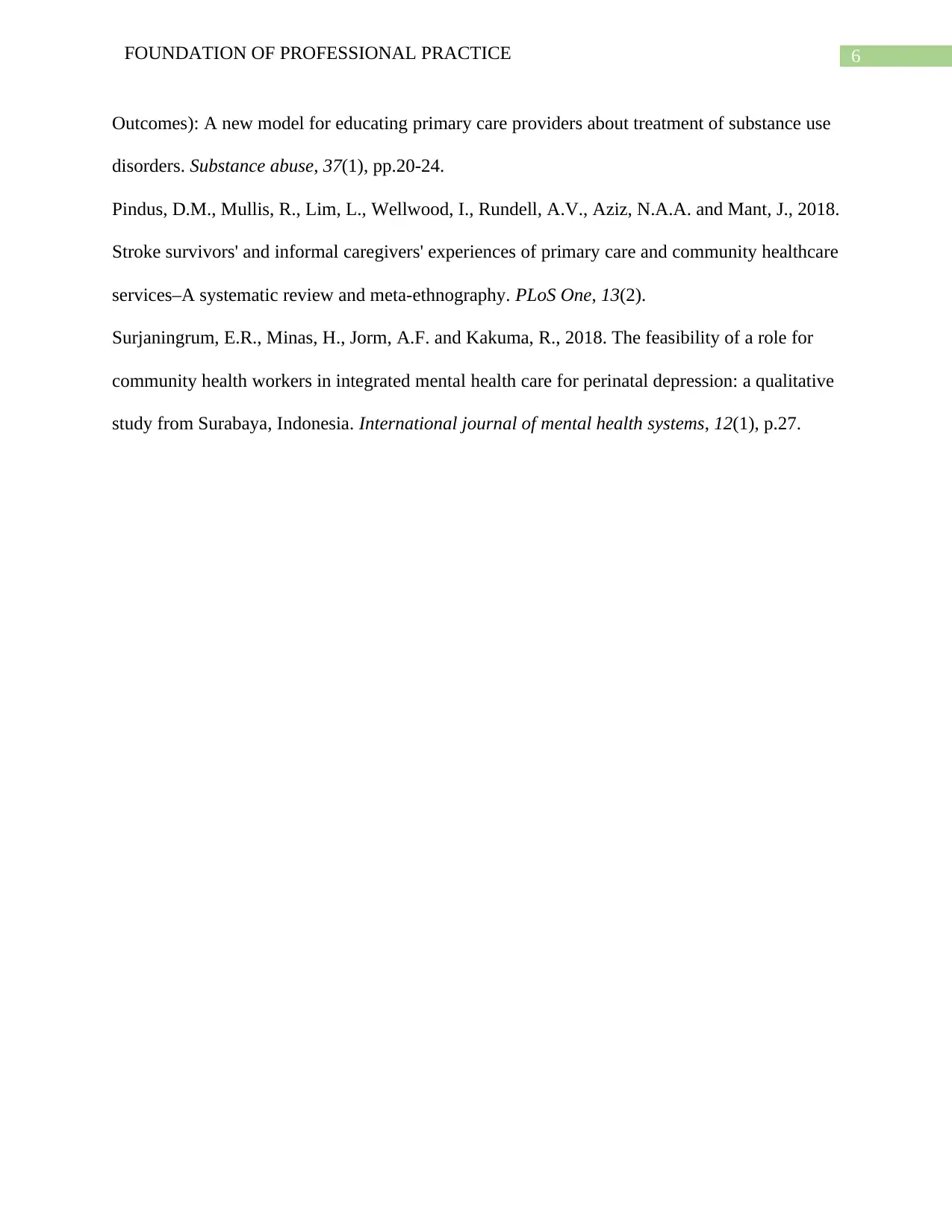
6FOUNDATION OF PROFESSIONAL PRACTICE
Outcomes): A new model for educating primary care providers about treatment of substance use
disorders. Substance abuse, 37(1), pp.20-24.
Pindus, D.M., Mullis, R., Lim, L., Wellwood, I., Rundell, A.V., Aziz, N.A.A. and Mant, J., 2018.
Stroke survivors' and informal caregivers' experiences of primary care and community healthcare
services–A systematic review and meta-ethnography. PLoS One, 13(2).
Surjaningrum, E.R., Minas, H., Jorm, A.F. and Kakuma, R., 2018. The feasibility of a role for
community health workers in integrated mental health care for perinatal depression: a qualitative
study from Surabaya, Indonesia. International journal of mental health systems, 12(1), p.27.
Outcomes): A new model for educating primary care providers about treatment of substance use
disorders. Substance abuse, 37(1), pp.20-24.
Pindus, D.M., Mullis, R., Lim, L., Wellwood, I., Rundell, A.V., Aziz, N.A.A. and Mant, J., 2018.
Stroke survivors' and informal caregivers' experiences of primary care and community healthcare
services–A systematic review and meta-ethnography. PLoS One, 13(2).
Surjaningrum, E.R., Minas, H., Jorm, A.F. and Kakuma, R., 2018. The feasibility of a role for
community health workers in integrated mental health care for perinatal depression: a qualitative
study from Surabaya, Indonesia. International journal of mental health systems, 12(1), p.27.
1 out of 7
Related Documents
Your All-in-One AI-Powered Toolkit for Academic Success.
+13062052269
info@desklib.com
Available 24*7 on WhatsApp / Email
![[object Object]](/_next/static/media/star-bottom.7253800d.svg)
Unlock your academic potential
Copyright © 2020–2026 A2Z Services. All Rights Reserved. Developed and managed by ZUCOL.





